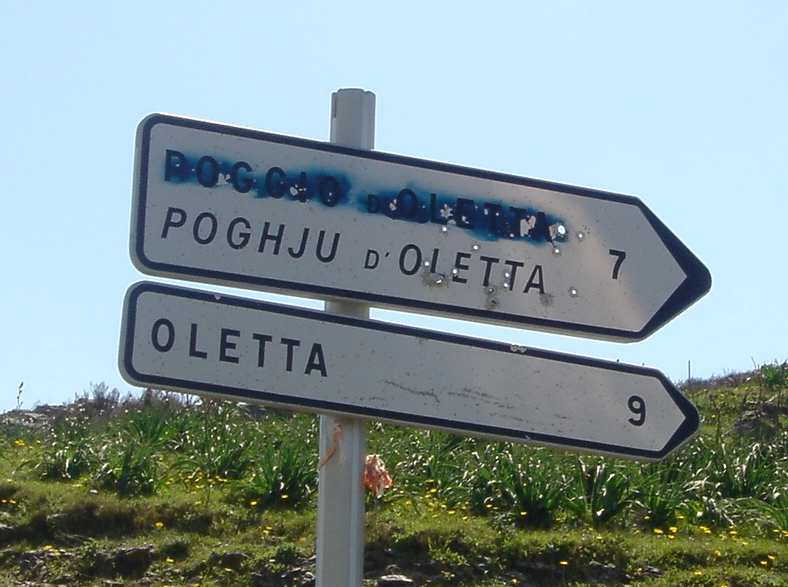Humor and Language Discoveries in Corsica
A few years ago, my wife Ulrike and I were staying in Ajaccio, Corsica. We had just arrived by ferry from Sardinia and on the drive from Bonifacio to Ajaccio noticed many road signs that did not look French. We had read up on the island by using the Lonely Planet's excellent guide Corsica and were aware of its colorful and dramatic history.
Napoleon Bonaparte was born in Ajaccio in 1769, just a year after France had acquired the island from the Republic of Genoa. And although this eventually created a strong link to France, we had also heard from French friends that tensions with Paris still existed regarding autonomy, culture, language, economic development, etc. More about that and the Corsican language later.
During a late afternoon walk, while exploring the neighborhood around our hotel, we came by a movie theater and were intrigued by the title of the advertised movie.
 Bienvenue Chez les Ch'tis
Bienvenue Chez les Ch'tis
The French movie playing there was “Bienvenue chez les Ch'tis.” We weren't familiar with the movie and didn't know what “les Ch'tis” meant. At first blush, we thought it referred to a phrase in Corsican. I did, however, recognize the name of the actor, Dany Boon, who is also the director of the film.
On the spur of the moment, and although the movie had already started, we decided to purchase two tickets. Groping for our seats in the dark in a nearly empty theater, we just arrived at the scene in which the new director of the local post office, played by Kad Merad, arrives in town during a rainy, miserable night. He almost runs over the other main character with his car, the local letter carrier, played by Dany Boon, who is to show the new boss his apartment.
The dialog that then develops had us soon laughing ourselves to tears: Boon's character tries to explain to his boss that there was no furniture in the apartment because it had all belonged to the former occupant: “c'était le sien” - it was his (furniture). However, in the dialect of the “Ch'tis,” it sounds like “c'était le chien.” (it was the dog)
Maybe you feel intrigued and want to watch the 2008 movie, as we did again a few days ago. The movie is not available on Netflix, but I discovered that you can get it on Amazon either as an instant download or as DVDs in original French, with English subtitles.
How wrong we were...
It was a few years later that we saw the actual beginning of the movie with the set-up of the postal director's involuntary transfer. We had, of course, realized even in Ajaccio, that the movie isn't set in Corsica, but rather in the northern part of France.
When you watch the movie from the beginning, you learn right away how this region is perceived in the south, and why being sent there is seen as punishment. The region, especially the Nord-Pas-de-Calais - quite undeservedly - has a reputation of not only being cold and inhospitable, but really being “in the sticks.”
However, a little “googling” also educated us about the fact that the “chti” or “chtimi” languages are part of the “Picard” group of languages, spoken in the far north of France and parts of Belgium.
A Language or a Dialect?
Picard, is one of the “langues d'oïl,” or “Old French” and belongs to the Gallo-Roman family of languages. Interestingly, Belgium's French Community has recognized Picard as a regional language. France, insisting on the other hand on linguistic unity, only recognizes one official national language.
If you are interested to learn more about the Picard languages, the different spellings and pronunciations, consult this Wikipedia entry, which I also used for much of the “Picard” information. You will also quickly see from the few examples below why the “ch” and “s” sounds can be confusing:
|
English |
Picard |
French |
|
Thank you |
Merchi |
Merci |
|
I am sorry |
Échtchusez-mi |
Excusez-moi |
|
How much does it cost? |
Combin qu'cha coûte? |
Combien ça coute? |
The Wikipedia article further notes:
“Today Picard is primarily a spoken language. This was not the case originally; indeed, from the medieval period there is a wealth of literary texts in Picard. However, Picard was not able to compete with the inter-regional literary language, which French became, and was slowly reduced to the status of a 'regional language.'
A more recent body of Picard literature, written during the last two centuries, also exists. Modern written Picard is generally a transcription of the spoken language. For that reason, words are often spelled in a variety of different ways (in the same way that English and French were before they were standardised).
One system of spelling for Picard words is very similar to that of French. This is undoubtedly the easiest for French speakers to understand, but can also contribute to the stereotype that Picard is only a corruption of French rather than a language in its own right.
Various spelling methods have been proposed since the 1960s to offset this disadvantage, and to give Picard a visual identity that is distinct from French.
At the present time, there is a consensus, at least between universities, in favor of the written form known as Feller-Carton (based on the Walloon spelling system – which was developed by Jules Feller– and adapted for Picard by Prof. Fernand Carton).”
In the book When Languages Collide, Brian D. Joseph et al. note on page 161: “In the French linguistic tradition Picard has been labeled a dialect.” But one of the editors then says: “Given that Picard is not a dialect of French, as it evolved side by side with French rather than out of French, I prefer to use the label language to refer to Picard.”
Linguists may argue whether Picard is a dialect or a language, but for those learning French, this distinction is irrelevant. If you're a learner, you're just trying to figure out the meaning of what you hear.
So, if you happen to be in a region where “old French” is spoken, familiarize yourself with some of the basic pronunciation differences to standard French, and you at least, will not confuse “sien” with “chien.”
The Corsican Language
During our stay in Corsica, we learned about Corsican history and culture: Its Italian heritage in medieval times, with Tuscany and then Pisa gaining control. In 1282, the island became part of Genoa until 1768, when it was sold to France.
An Italo-Dalmatian Romance language, Corsican became “gallicised” after France's acquistion. While the Corsican language appeared to be in serious decline for many years, in the 1980s the French government reversed its unsupportive stand and initiated some strong measures to save it.
Although Corsica is a small island, its geography may have encouraged the formation of different dialects: Supranacciu, spoken in Bastian and Corte and generally in the north; Suttanacciu, spoken in Sartène and Porto-Vecchio and generally in the south; the dialect spoken in Ajaccio; the dialects of Calvi and Bonifacio, which resemble the dialect of Genoa; the local dialect of the Maddalena archipelago. A Corsican dialect is also spoken in the norther part of Sardinia.
We found this corsica-isula web site especially helpful and interesting, as it not only provides an introduction to the Corsican language, but also links to other sites and Corsican dictionaries. Corsican also has a rich tradition of writers and poets. To find out more, click here.
We have to confess that in spite of speaking French quite fluently and understanding Italian well, we were never able to understand Corsican conversations in bistros or cafes, maybe also because of the various dialects.
We certainly felt that our Italian helped us more than French for picking up a word here or there. However, the bilingualism of Corsicans is impressive, and we never had any trouble conversing in French.
Corsican Impressions
 One of the strong impressions of our 7-day drive through the island - from Bonifacio, to Adjacio, through the middle of the island, Corte, and on to Bastia and Calvi - was this: Corsicans are proud of their land and their language. Nearly all road signs we saw, either had the French name painted over and often, obliterated by bullet holes as in this left picture.
One of the strong impressions of our 7-day drive through the island - from Bonifacio, to Adjacio, through the middle of the island, Corte, and on to Bastia and Calvi - was this: Corsicans are proud of their land and their language. Nearly all road signs we saw, either had the French name painted over and often, obliterated by bullet holes as in this left picture.
While Corsicans are pleasant and accommodating to tourists like us, they don't particularly like foreigners buying land or even condominiums. While we were in Ajaccio, a small bomb exploded (nobody hurt) at the front door of a condominium, which had just been purchased by a German.
We heard stories about the ill-fated French government's efforts to re-settle people who were called “pieds noirs.” They were French citizens who had lived in Algeria, but fled after the country became independent in 1960.
A good description of this period (and many other facts about Corsica) can be found on page 197 in the Lonely Planet's Corsica. The unrest of the seventies and eighties seems to have abated (but, as the bombing incident mentioned above indicates, it's not quite finished).
We found Corsica a wonderful island to visit. We had lots of great experiences: our arrival in Bonifacio, a small town, perched on a limestone pedestal (see picture); the capital of Ajaccio with its connection to Napoleon; the rugged landscape and the snow-covered mountain tops in April, while we were driving across to Corte on excellent roads (see picture above).
In a museum in Corte we discovered a hand-drawn language atlas which showed linguistic boundaries of individual words, tracing them from the island's south to the north. And we did not even take advantage of the many great beaches, and the snorkeling and diving opportunities that fill the guidebooks.
Just watching “Bienvenue Chez le Ch'tis” again the other day brought back many memories from that trip and made us think again how powerful and ultimately wrong some misconceptions about people, their languages and pronunciations can be.
Bio: Peter Rettig is the co-founder of Gamesforlanguage.com. He is a lifelong language learner, growing up in Austria, Germany, and Switzerland. You can follow him on Facebook, Twitter and Instagram, and leave any comments with contact.
